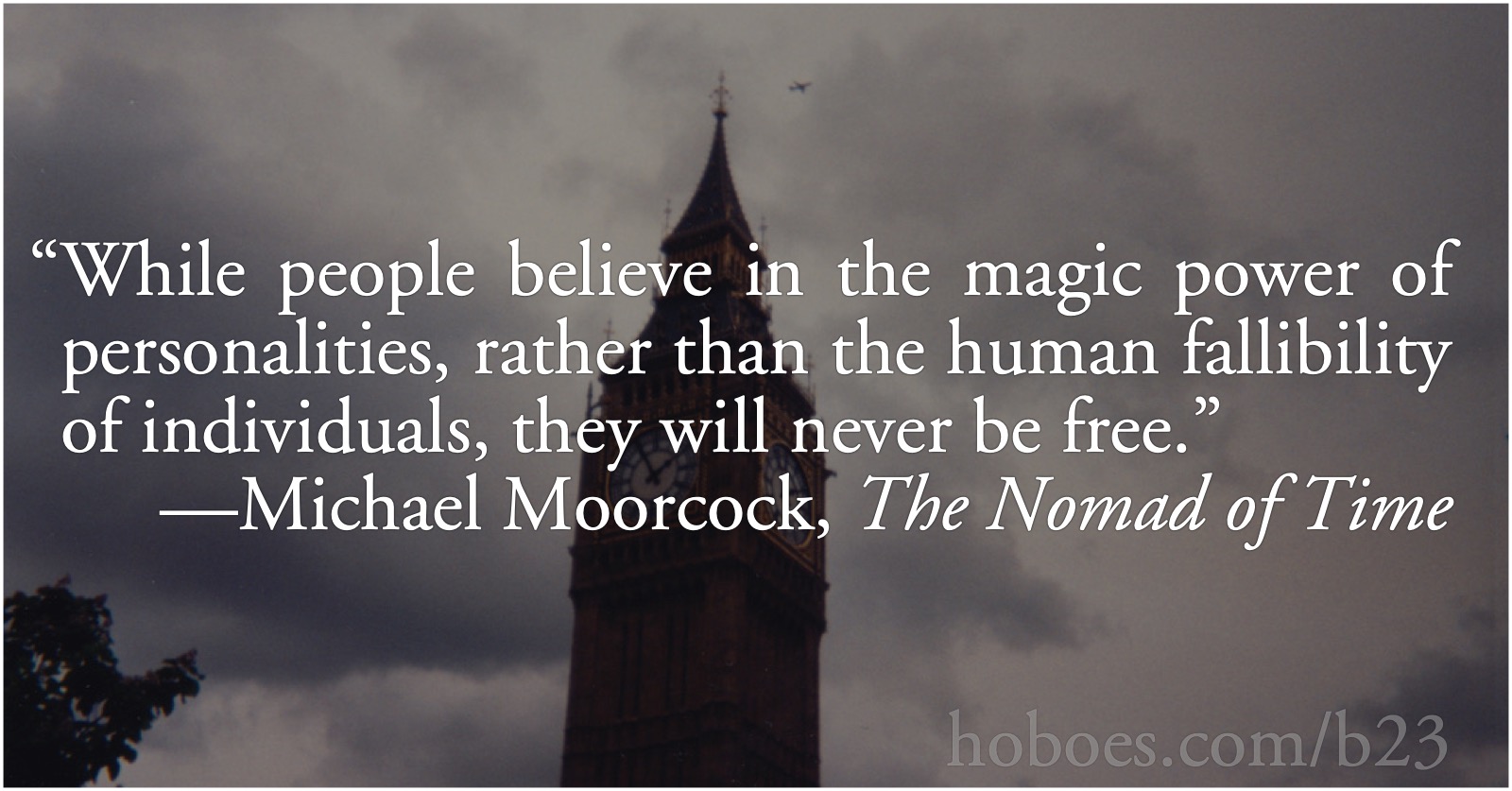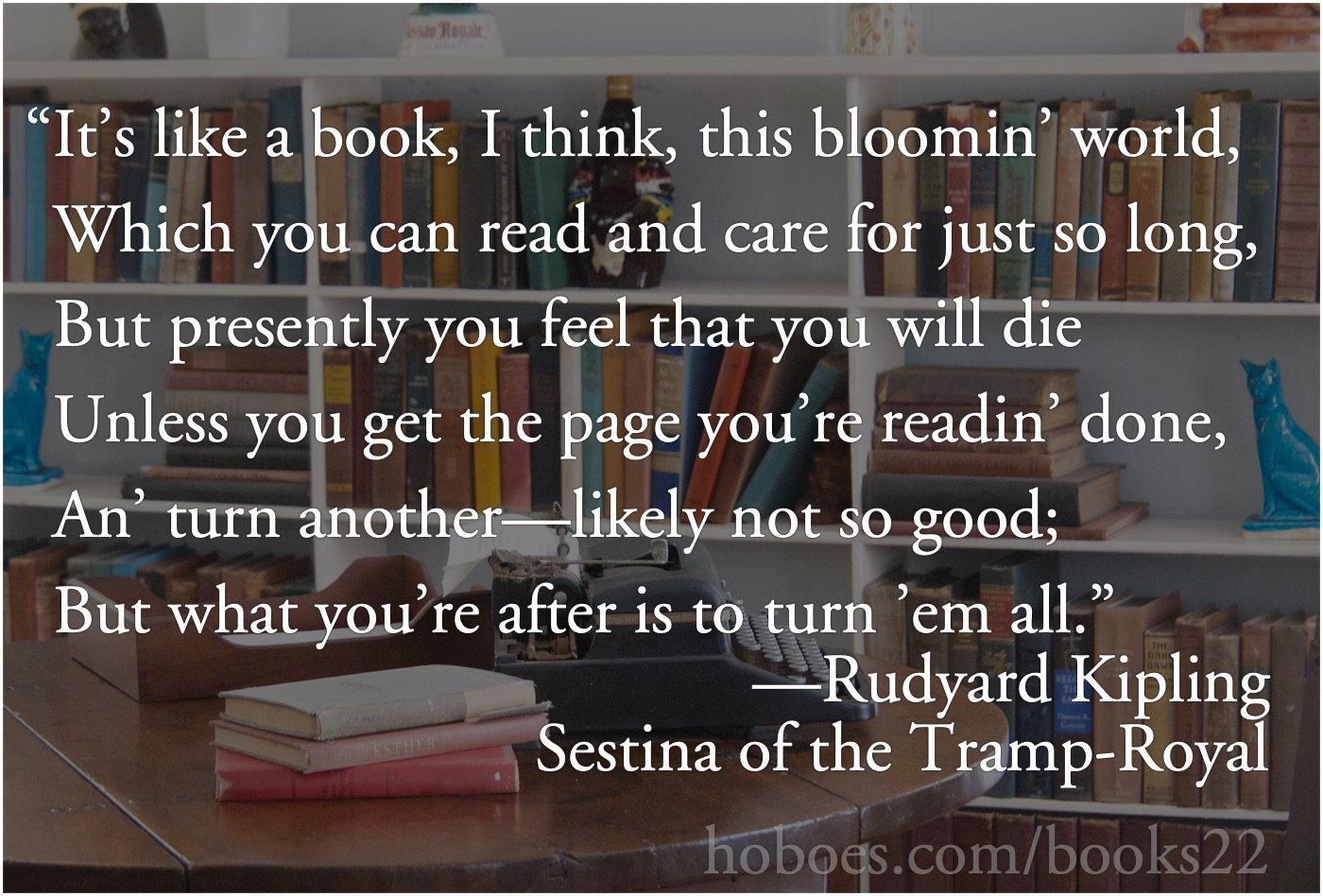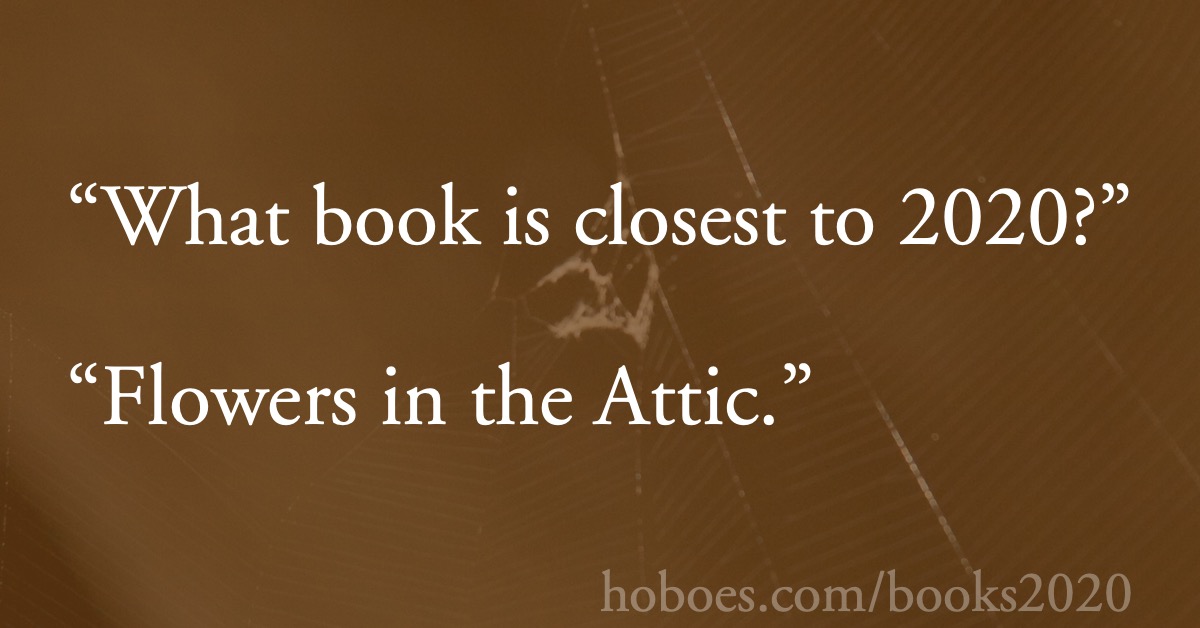The Case for Books in 2015
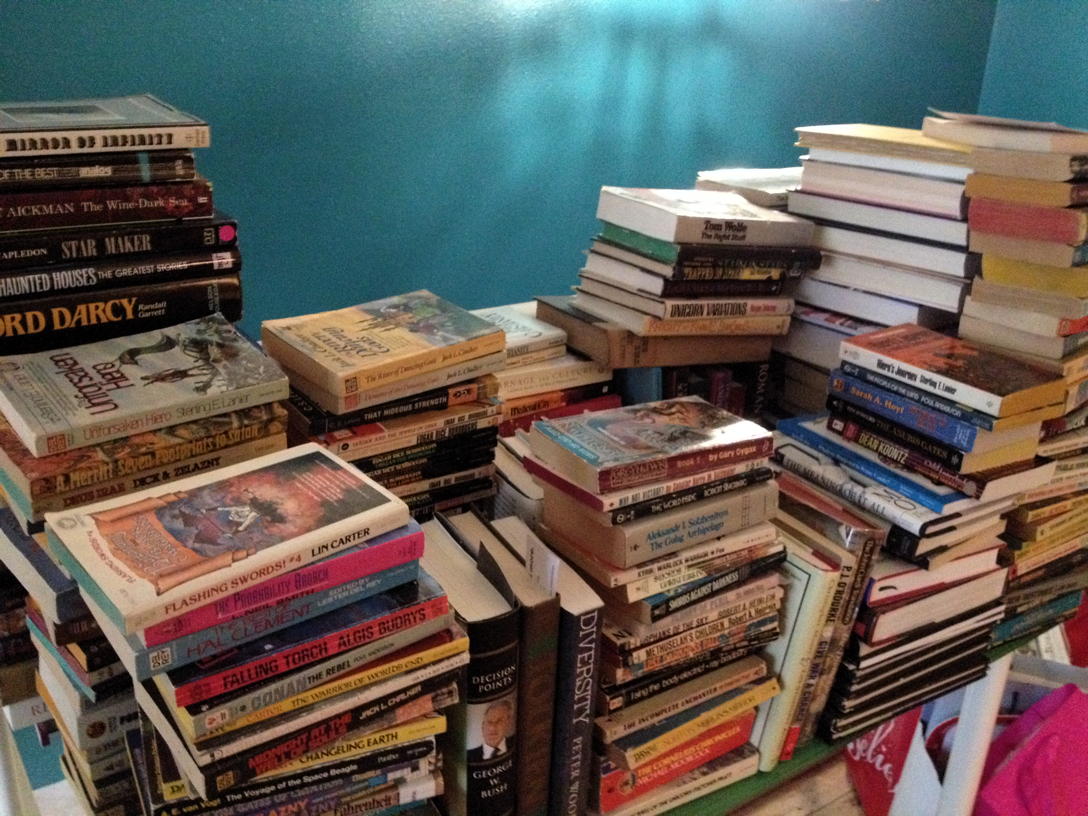
This table is slated to collapse unless I curb the impulse to buy more books before I’ve read what I have!
Happy New Year! I started using Goodreads in 2014 to track what books I read, and that means 2015 is the first full year of tracking. According to Goodreads, I read 107 books this year. According to my database, I purchased 162 books. New Year’s Resolution: for every book I buy, I need to read at least two. Otherwise my to-read table is going to collapse.
Goodreads tells me the most popular book I read this year was Kafka’s Metamorphosis. That makes sense, I suppose. It’s a book that a lot of people have to read for school. Of course, it’s not really a book, it’s really a short story, but it’s old enough that it’s available separately on Project Gutenberg, and it’s used in enough institutional settings that it’s also available separately in print.
The longest book I read was Dhalgren•, and that sounds right. It certainly took a long time to read. Of Human Bondage may be longer, but I’m reading that as an ebook and so haven’t finished it yet. I read ebooks when I have time outside the house, which means that they take longer to read anyway, and this book is long enough even without that drag.1
The least popular was an indie comic book collection, Knights of the Dinner Table, Volume 45. Well, it’s a niche publisher in a niche market.
Somewhat surprisingly, the best book I read, according to Goodreads, was The Art of Syrian Cookery•. This book gets 4.8 stars on average, where five stars, the highest score, means “it was amazing”. It probably helped that only five people have rated it, and I know I tend toward the middle on rating scales2, but if this book was amazing—and in truth, I really liked it—what was Metamorphosis?
Then again, Goodreads says I gave Lebanese Cuisine• five stars. At this point I couldn’t say why. Possibly its garlic sauce recipe put it over the top. Metamorphosis has no garlic.
My year was bookended—hah—by The House on the Borderland and The Best of C.L. Moore. Both were, if not groundbreaking (and the case can be made for Moore) definitely unique.
My largest haul this year was from the local Half Price Books annual warehouse sale. My biggest haul from outside Round Rock was a three-way tie of eight books each at Chicago’s Bookman’s Corner, St. Louis’s Patten Books, and Las Cruces’s COAS Books. In Chicago I picked up several Tarzans, as well as Robert Silverberg’s intriguing collection of 1973 newcomers, Chains of the Sea•. In St. Louis I found an amazing selection of older Science Fiction I’d been wanting, including Fredric Brown, Fletcher Pratt, Sterling Lanier, and Margaret St. Clair.
And in Las Cruces I finally found the Henry Kuttner and Murray Leinster Best Ofs as well as the hard-to-find Science Fiction Hall of Fame IIB. I owned the Murray Leinster collection as a teen and have no idea where it went.
The non-local bookstore I bought the most books from was the inimitable Twice Sold Tales in Seattle, which I visited a couple of times since my girlfriend moved there. They are a treasure trove of old science fiction and new literary fiction. I finally found Ward Just’s Echo House there, as well as three of the Best Ofs I’ve been looking for: Fritz Leiber, Hal Clement, and Stanley Weinbaum.
It’s been a good year for book-hunting.
Back on Goodreads, my five-stars this year (besides Lebanese Cuisine•) were, in order of reading, John Algeo’s• Origins and Development of the English Language•, Ray Bradbury’s Zen in the Art of Writing•, Walter Tevis’s• Mockingbird•, Natan Sharansky’s The Case for Democracy, Ward Just’s The Congressman Who Loved Flaubert, Philip K. Dick’s We Can Remember It For You Wholesale•, Allen Drury’s Advise & Consent, and Jack Vance’s• The Dying Earth•.
I definitely recommend all of these, and for good measure I’d add Julie Schumacher’s• Dear Committee Members• and Fouad Ajami’s The Dream Palace of the Arabs. Their endings were not as insightful as their beginnings, but the first was hilarious to read to that point and the second extremely educational.
If you only take three books from my recommendations, I’d say Mockingbird•, The Case for Democracy, and Advise & Consent. Walter Tevis• is always worth reading, Advise & Consent was a fascinating romp into Senatorial politics, and The Case for Democracy was an eye opener on how—and why—our foreign policy has been failing.
Though if you do happen to see Lebanese Cuisine, snatch it up.
- January 17, 2024: My Year in Books: 2023
-
This was a relatively slow year for books. According to Goodreads, I read an even 100, but quite a few of them were cookbooks. I’ll be writing about them later in 2023 in Food. Fictionwise, I started the year with Jack Vance’s Eight Fantasms and Magics. You could hardly do better. Vance is a master of fantasy, and a pretty good hand with science fiction as well. Especially when his science fiction looks like fantasy.
The green light floods the planet, and I prepare for the green day.
I ended the year with Lee Gold’s marvelous fantasy Valhalla: Into the Darkness. Gold is the proprietor of the Alarums & Excursions roleplaying zine (of which I’m a part) and shows the true role-player’s dedication to accurate mythology. While the dead role-player who was the protagonist of the first book remains here, this book’s protagonist is an Internet-obsessed squirrel who lives on the world tree.
I sang as I ran, and I never got tired. I was inspired, rhymes blazing like fire. I can’t even begin to tell you what it was like. When I ran across a patch of ash honey, and the bees swarmed up and stung me, I cried out in joy, because I knew just how they felt.
If you enjoy weird fantasy with a fairy-tale bent that’s deeply rooted in real mythology, you will enjoy Gold’s series.
I read three sailing books toward the end of the year, although only two really count. I finally got around to reading Patrick O’Brian’s Master and Commander; while reading that in paperback, I also started up a new ebook, David Weber’s On Basilisk Station, the first of the Honor Harrington series. I had no idea when I started it that it was clearly either inspired by Master and Commander or by the same books that inspired Master and Commander.
- January 11, 2023: My Year in Books: 2022
-
Not including the cookbooks (I’ll have more about 2022 in Food in a later post), my year in books began with Hoplites: The Classical Greek Battle Experience, a fascinating collection of essays about the dawn of civilized war, and ended with Mack Reynolds’s Code Duello, a very strange letdown about frivolous fighting on far planets. In fact, two books I read in December were letdowns. I see Mack Reynolds all over in the old paperbacks section of used bookstores, and somehow confused him with a writer of a spy or thriller series of some kind. No idea who, now.
The other disappointing December book was a Dorothy Parker collection; I’d never read her before, and of course you keep hearing about her as a very witty writer. I found her mostly repetitive and condescending.
Tastes vary.
My penultimate book was a re-read: the Alan Moore and Dave Gibbons comic book, Watchmen. I’ve been rereading a handful of Alan Moore’s best works lately. Both Promethea and V for Vendetta. They’re connected by Moore’s fascination with superhumans taking it upon themselves to save humanity from themselves, whether humanity wants it or not.
Sadly, minus the superhuman part that’s always an important topic. Which makes me glad to see that Watchmen is also the most-shelved book I read this year.
Alan Moore’s are not the only comics I chose to re-read in 2022. I also reread The Essential Calvin and Hobbes. I still remember the first time I read this book, just out of college, when one of my roommates had left it lying around. He probably regretted that, because I could not stop laughing out loud in the middle of the night, nor could I put it down. Calvin’s world is a world that doesn’t exist, and one I’ve never lived in, a suburban countryside where six-year-olds can wander downtown alone with their teddy bear (or, in this case, tiger), but it is hilarious despite my complete lack of reference points. Watterson riffs on the essential absurdity of man’s imagination, and it isn’t just Calvin’s imagination. Calvin’s father is quite the storyteller, too.
- January 12, 2022: My Year in Books: 2021
-
Man looks for patterns in everything, but I don’t think I could have chosen a better opening quote for the first review of the year:
…man is born to trouble, and it is best to meet it when it comes and not lose sleep until it does. — Louis L’Amour (The Daybreakers•)
But then, Louis L’Amour is a great author to start any year with. I followed The Daybreakers up with Shalako and Conagher with a little detour through The Iron Marshall. I ended the year with Radigan.
L’Amour continually surprises me by coming up with very different takes on the Western hero. His heroes in each of those stories are very different. They run the gamut from wild men coming in from the desert, to big city gangsters on the run, to (almost) backwoods lawyers defending their ranch.
And then, in June in Nashville, I discovered his autobiographical Education of a Wandering Man. He lived a fascinating life, and it’s not hard to see where he got his ideas for such varied characters when you see what a varied life he’s led!
I also finally read Asimov’s Foundation trilogy. I’d read the first book long ago, but never the series. I picked up a boxed set of the trilogy at a yard sale back in 2017, but it looked like a dense read and it took a while to commit to reading all three.
It was a dense read; there is a lot of weird retro psychology going on. It’s fascinating both as a well-written story and as a glimpse into the mindset of one class of science fiction author in the golden age. Asimov took what most authors, and most people, would regard as a nightmare: a benevolent dictatorship rewriting history down to the contents of your brain, manipulating people into false insights, conspiracy, and even a deadly galactic war, all for their view about how the tide of history should flow.
- January 20, 2021: The Year in Books: 2020
-
Despite the opening quote1, the year started out deceptively wonderful on the book front. I went to Miami with a friend in February. I didn’t buy any books, but I did get out to Key West and saw Hemingway’s library and typewriter. And I admired the cemetery marker for local Key West author Jane Louise Newhagen.
Then, in March, I went to Raleigh. I didn’t know at the time, but the only new bookstores I would visit in 2020 would be those bookstores in Raleigh at the beginning of the year, and a junk store in Michigan toward the end of the year.
Happily, both were fruitful.
In Raleigh I picked up the second of Chaim Potok’s Asher Lev books. And finally fulfilled a programming urge that’s been on the back of my mind for over a decade: I picked up Exploring Expect and ran through the tutorial on the Expect scripting language. I also found a really nice Richard Feynman• book I hadn’t known existed, the book version of his famous Cornell lectures—which I also hadn’t known existed. After reading the book, I watched the movie.
I also found a couple of DC Heroes adventures, one of which I ran to great fun at the North Texas RPG Convention.
Then, on Friday, March 13, while I was in the air returning home, the whole country started to shutdown. That was it for all the great book sales for the rest of the year.
In August as Texas began to open up I decided to get out of the house and go on my I-35 book drive again. I visited the Book Cellar in Temple, Brazos Books and Golden’s Book Exchange in Waco, and McWha Bookstore in Belton. I’ve been to all of these bookstores before, and always enjoy the visit.
- January 1, 2020: The Year in Books: 2019
-
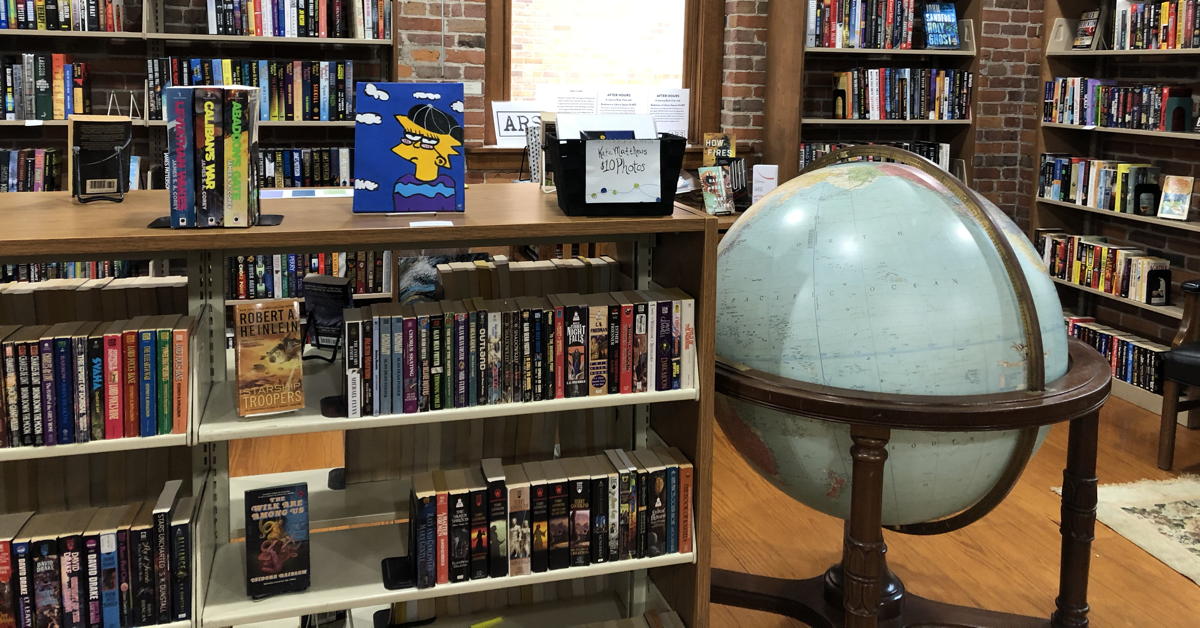
If you find yourself in Little Rock, the Bookstore at Library Square is a great place to browse and relax.
It has been a very good year for books, and I even made a dent in my to-read pile. According to my database, I acquired 136 books this year, and according to Goodreads I read 145.
Since my to-read pile is a double-wide bookcase, I should be through it in about twenty years.
The Goodreads “year in books” is an interesting summary, but some of its categories are antiquated. In the era of ebooks, I don’t know that “shortest book read” makes a lot of sense. The shortest book I read this year was, of course, a short story. It was a very good short story, Lauren Pope’s1 fun Just Another Oppressor. Sadly, as far as I can tell it’s no longer available.
The longest book was IBM’s Early Computers•, a fascinating look at the history of digital computers through the growth of a company that could have been destroyed by them. IBM was a mechanical device company. They made typewriters, and card readers, all mechanical devices for aiding in data collection and analysis. All of them destined for the junkyard. Had IBM not completely shifted their focus, they would have gone out of business.
The most popular book was a science fiction book, Dune. I read Dune ages ago, along with Dune Messiah, but never got around to finishing the trilogy. This year I vowed to read the full three books, and did so. It is not surprising that this science fiction book is incredibly popular and remains so. It touches on just about everything that it means to be human.
The least popular book I read varies, because I read several books that “0 people also read”. What that means, of course, is that zero people read them and then notified Goodreads. Currently in that slot is Instant BASIC•. It’s filled with public domain art and era-specific jokes
I continued reading a lot of late seventies/early eighties computer books this year, which meant a lot of BASIC. The very first book I finished in 2019 was 24 Tested Ready-to-Run Game Programs in BASIC.
- January 2, 2019: The Year in Books: 2018
-

This was a very nice, and small, haul from nearby Temple’s Public Library sale—plus one book from McWha Books and one from Amazon. I still have three of these to read, and am currently halfway through Kip Thorne’s book, which I fully expect to be on next year’s recommendations.
According to Goodreads, I read 133 books last year; according to my own databases, I bought 134. That’s teetering on the edge of sustainability. The latter number also includes reference books downloaded to my tablet that I don’t need to read per se, and instruction manuals that I have read but that don’t get counted on Goodreads.
Which means I am making a dent in my to-read shelf/ves, albeit slowly.
According to Goodreads, the shortest book I read was Lawrence W. Reed’s Great Myths of the Great Depression. At only twenty pages, it’s a good overview of the period as seen through the eyes of the people who lived it.
The longest book was The Essential Ellison, which, unless you want to know more about Ellison’s work, I don’t recommend. Unfortunately, when I read Ellison I tend to find his introductions more interesting than his works, and this book contains other people’s introductions, not his.
The most popular book I read this year was Orson Scott Card’s Ender’s Game, which I highly recommend, preferably before you see the movie if you haven’t yet. I saw the movie and still thoroughly enjoyed the book. The sequel, Speaker for the Dead was very different and just as enjoyable.
The least popular book, not surprisingly, is a guide to a computer that was discontinued long before Goodreads was founded. Goodreads was launched at the very end of 2006, and the Tandy 200 was a 1985-era computer1. So it’s not surprising that I needed to request an update of the bibliographic data and cover for Lien’s books.
The shortest book was Mike Sirota’s The 22nd Gear•, at one page. This is, of course, completely wrong, but Goodreads still doesn’t let readers easily update book data; whatever data gets put in by the first reader is written in stone, as far as I can tell, unless you go to the trouble of contacting a librarian. That’s something I hope they’ll fix. It’s especially annoying for me not being able to upload a cover image for books that weren’t given a cover image when first entered into the system.
↑According to Goodreads, my average was 3.6, three being “I liked it”.
↑
books
- Jerry@Goodreads: Jerry Stratton at Goodreads
- On my Goodreads account, you can see how erudite and well-read I am.
- Seattle, Washington: Twice Sold Tales
- If you’re in Denver and you’re a science fiction/fantasy fan, you really owe it to yourself to stop into Twice Sold Tales.
cookbooks
- The Art of Syrian Cookery•: Helen Corey (hardcover)
- This 1962 book is subtitled “A Culinary Trip to the Land of Bible History—Syria and Lebanon”. This is a cookbook by a member of the Syrian Antiochian Orthodox Church in the United States. The recipes are from the author’s mother, who came from Syria and ended up in Ohio. As such, they are relatively easy to find ingredients for. One ingredient I have not yet found is crushed black cherry pit, or mahleb. I’m looking forward to making some anise bread when I do find it.
- Lebanese Cuisine•: Madelain Farah (paperback)
- If you’re looking for some unique, yet easy-to-make dishes, this is a great choice. The tomato-garlic salad and the garlic-lemon sauce have been permanently added to my menus.
novels
- The 22nd Gear•: Mike Sirota (paperback)
- Like the Odd Thomas series, this is basically just some guy who happens to be throwing all his thoughts down on paper after extraordinary events occur. In his case, it’s the ability to ride a bike path to other dimensions, times, and places, meet strange new creatures, and run from them in abject fear. This third installment is as fun to read as the first two, and just as strange.
- Advise & Consent
- This Senatorial procedural could be straight from Dumas, and the themes hidden in the action are timeless.
- Dear Committee Members•: Julie Schumacher (paperback)
- I spent much of my career at a small University, and the insular office politics rings very true—so much so that there are people to whom I would not recommend reading this as it might cause dangerous flashbacks. It is extremely funny. Professor Fitger no longer cares about advancing his career and so writes honestly but, for the most part, effectively.
- Dhalgren•: Samuel R. Delany (paperback)
- The main character is a mysteriously charismatic guy who doesn’t want the fame. He uses his charisma to stumble upon running the gang, and takes advantage of the hero worship to get a girl and a teenage boy to sleep with. For all that there are 800 pages to work with, the author does not really deal with this fact, other than to make it clear the boy is infatuated because of the hero-worship. If you don’t like that (and it’s reasonable not to) you probably won’t like this book. Delany is a good writer. There are definitely significant portions of these 800 pages that I enjoyed, and I’m glad I read it. If that doesn’t exactly sound like a ringing endorsement, well, it isn’t. But it’s such an idiosyncratic work the only way to know you’ll enjoy is to start reading it.
- Echo House
- Ward Just’s story of three generations of Washington power brokers unknown by pretty much everyone outside of DC.
- The House on the Borderland: William Hope Hodgson at Project Gutenberg (ebook)
- A strange book of the inexplicable cosmos variety. The owner of an ancient house has to contend with the mundane strangenesses of swine-like creatures from the deep, and far more cosmic dangers transcending space and time.
- Mockingbird•: Walter Tevis (paperback)
- Ignore it and it will go away. That is the ultimate philosophy in New York City in the 25th century. This is a world where we have given all of our care over to the robotic state, trained ourselves to be perpetual children, and have lost all sense of our own destiny. Into this world comes a man who accidentally learned how to read.
other
- The Case for Democracy
- When did America forget that it’s America?
- The Dream Palace of the Arabs
- This is a great introduction to the strange factions of the Arab world, the Shiites, the Sunnis, the Orthodox Christians of Lebanon, Saddam Hussein vs. the princes of Kuwait.
- Knights of the Dinner Table
- You can find some on-line strips, extra supplements (such as the top secret Jackson document), as well as links to Kenzer’s store for each of the collections. Their new site can be slow at times, but if you’re a gamer the product is worth it.
- The Origins and Development of the English Language, Third Edition•: Thomas Pyles and John Algeo (hardcover)
- A concise guide to the history of the English language, with a subtle humor.
- Zen in the Art of Writing•: Ray Bradbury (paperback)
- Bradbury is enthusiastic not just about writing, but about you writing. Within this book, he tells us what we can, as writers, learn from lizards and from zen. Run fast, stand still, work, relax, and stop thinking. He also includes very specific and planet-bound advice, such as to write every day so as to make writing as unconscious as breathing; to use word-association to build a notebook of ideas which will help you fill your daily writing schedule; he tells you what kinds of books to read and how to choose them.
More books
- My Year in Books: 2023
- It’s been a slower year in books than previous ones, but it was still a year of fantasy in the past, in the future, and across time, as well as an unplanned foray into people doing the impossible and changing the world.
- My Year in Books: 2022
- From Hoplites to Venice… California, this has been a year in books filled with war, evil, and the dehumanization of man. But it’s also been a year of high adventure, magic, and larger-than-life heroes.
- My Year in Books: 2021
- From Louis l’Amour to slavery to H. Rider Haggard, it’s been a very good year in books.
- The Year in Books: 2020
- What did 2020 have to offer in books?
- The Year in Books: 2019
- 2019 was a great year for reading old books.
- One more page with the topic books, and other related pages

